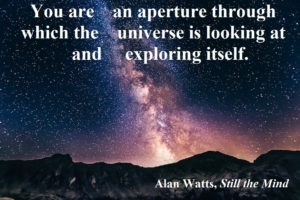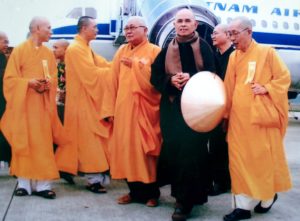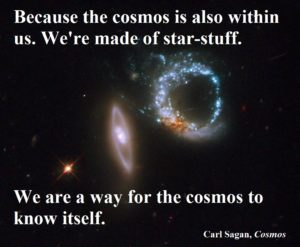
I would like to share a long excerpt about interconnectedness from Peace is Every Step, a short book by Buddhist philosopher, monk, and peace activist Thich Nhat Hanh; I’ll give some of my thoughts below that. Near the end of the book, he writes:
“Usually we think that the tree is the mother and the leaves are just the children, but as I looked at the leaf I saw that the leaf is also a mother to the tree. The sap that the roots take up is only water and minerals, not sufficient to nourish the tree. So the tree distributes that sap to the leaves, and the leaves transform the rough sap into elaborated sap and, with the help of the sun and gas, send it back to the tree for nourishment. Therefore, the leaves are also the mother to the tree. […]
“We do not have a stem [umbilical cord] linking us to our mother anymore,” for “on the day we were born it was cut off, and we received the illusion that we became independent. That is not true. We continue to rely on our mother for a very long time, and we have many other mothers as well. The Earth is our mother. We have a great many stems linking us to our Mother Earth. There are stems linking us with the clouds. if there are no clouds, there will be no water for us to drink. We are made of at least seventy percent water, and the stem between the cloud and us is really there. This is also the case with the river, the forest, the logger, and the farmer. There are hundreds of thousands of stems linking us to everything in the cosmos, supporting us and making it possible for us to be. Do you see the link between you and me? If you are not there, I am not here.” […]
He goes on to explain that the leaf doesn’t fear falling (dying). “I am not limited by this form. I am also the whole tree, and when I go back to the soil, I will continue to nourish the tree.”
This is obviously a very expansive use of the word ‘I’. Certainly your individual consciousness and identity as it exists today won’t go on after your death; but then again, your identity isn’t static in the first place, and you’d have a hard time convincing me that ‘myself’ at age 6 was the precisely the same person that ‘myself’ refers to right now, or that the 80-year-old (hopefully) around and wearing my name decades from now will be the same ‘myself’. So I’m open to this expansive use of the term ‘I’.

Indeed, in the next chapter, Hanh discusses the ways we separate ourselves from others, for example, identifying with opposing sports teams or picking sides in a war (usually the side being threatened). But he highlights people who, despite themselves living in safety or comfort, identify the interdependent nature of life and seek to help those suffering from war, starvation, and oppression:
“They know that the survival of underdeveloped countries cannot be separated from the survival of the materially wealthy, technically advanced countries. Poverty and oppression bring war. In our times, every war involves all countries. The fate of each country is linked to the fate of all others. […] The only way to end the danger is for each of us to […] say to the others, ‘I am your brother’. ‘I am your sister.’ ‘We are all humankind, and our life is one.’”
Another chapter investigates reconciliation when we’ve made enemies (perhaps from wronging someone or being wronged, but you could also think about, say, people of vastly differing political ideologies). He says:
“When you begin to see that your enemy is suffering, that is the beginning of insight. When you see in yourself the wish that the other person stop suffering, that is a sign of real love. But be careful. Sometimes you may think that you are stronger than you actually are. To test your real strength, try going to the other person to listen and talk to him or her, and you will discover right away whether your loving compassion is real. You need the other person in order to test. If you just meditate on some abstract principle such as understanding or love, it may just be your imagination and not real understanding or real love.”
It’s easy to talk abstractly about interconnectedness, even with those we disagree with — even with those we are at war with — but it’s another thing entirely to hold that idea in your heart when you’re debating some ignorant, rude person online or when you’re contemplating the humanity of soldiers violently invading their neighbor’s country.
Loving Expansively
It’s easy, Hanh argues, to get indignant — righteously indignant — and take sides in conflicts, and we often need that indignation in order to act. But what we need more, he argues, is people capable of loving expansively, “of not taking sides so that they can embrace the whole of reality.”
Not taking sides, of course, feels a little like a cop out. When oppression is happening, failure to act is taking a side. And I think he gets this, because in his next paragraph he’s implicitly counseling against inaction when he urges us to feel interconnection to those who are suffering even when they may be different from us or far away from the comforts of our life.
“We have to continue to practice mindfulness and reconciliation until we can see a child’s body of skin and bones in Uganda or Ethiopia as our own, until the hunger and pain in the bodies of all species are our own. Then we will have realized non-discrimination, real love. Then we can look at all beings with the eyes of compassion, and we can do the real work to help alleviate suffering.”
But this is the easy piece of what he’s building up to here. Of course we should try to help those who are suffering, and we’re more likely to do so once we recognize how interconnected we are with them, how they are part of us and we are part of them. Of course we want to help those who are suffering…but what about those who cause the suffering, those who do wrong, those who commit atrocities? Are they too suffering? Are we also part of them and they of us? This is where it gets really interesting to me.
Here he introduces a poem he wrote about the tragic circumstances of refugees following the end of the Vietnam War in the 70s. He had received many letters from refugee camps in Singapore, Malaysia, Indonesia, Thailand, and the Philippines, hearing that many — perhaps half — of those refugees coming in on boats never arrived safely at the shores. Among other things, sea pirates were brutally attacking the refugee boats. Hanh had received one letter, in particular, about a 12-year-old girl who was raped by a pirate and subsequently jumped in the ocean and drowned.
“When you first learn of something like that, you get angry at the pirate. You naturally take the side of the girl. As you look more deeply you will see it differently. If you take the side of the little girl, then it is easy. You only have to take a gun and shoot the pirate. But we cannot do that. In my meditation, I saw that if I had been born in the village of the pirate and raised in the same conditions as he was, there is a great likelihood that I would become a pirate. I saw that many babies are born along the Gulf of Siam, hundreds every day, and if we educators, social workers, politicians, and others do not do something about the situation, in twenty-five years a number of them will become sea pirates. This is certain. If you or I were born today in those fishing villages, we may become sea pirates in twenty-five years. If you take a gun and shoot the pirate, you shoot all of us, because all of us are to some extent responsible for this state of affairs.” [emphasis mine]
Which finally brings me to Hanh’s famous short poem “Please Call Me By My True Names“:
Do not say that I’ll depart tomorrow
because even today I still arrive.
Look deeply: I arrive in every second
to be a bud on a spring branch,
to be a tiny bird, with wings still fragile,
learning to sing in my new nest,
to be a caterpillar in the heart of a flower,
to be a jewel hiding itself in a stone.
I still arrive, in order to laugh and to cry,
in order to fear and to hope.
The rhythm of my heart is the birth and
death of all that are alive.
I am the mayfly metamorphosing on the surface of the river,
and I am the bird which, when spring comes, arrives in time to eat the mayfly.
I am the frog swimming happily in the clear pond,
and I am also the grass-snake who, approaching in silence, feeds itself on the frog.
I am the child in Uganda, all skin and bones,
my legs as thin as bamboo sticks,
and I am the arms merchant, selling deadly weapons to Uganda.
I am the twelve-year-old girl, refugee on a small boat,
who throws herself in the ocean after being raped by a sea pirate,
and I am the pirate, my heart not yet capable of seeing and loving.
I am a member of the politburo, with plenty of power in my hands,
and I am the man who has to pay his ‘debt of blood’ to my people
dying slowly in a forced labor camp.
My joy is like spring, so warm it makes flowers bloom in all walks of life.
My pain is like a river of tears, so full it fills the four oceans.
Please call me by my true names,
so I can hear all my cries and laughs at once,
so I can see that my joy and pain are one.
Please call me by my true names,
so I can wake up,
and so the door of my heart can be left open,
the door of compassion.
I find this really powerful. It’s easy to call for compassion for those who are suffering, but it’s much harder to extend that same compassion toward those that cause suffering, those that do vile things. It’s hard to not hate those who commit horrible deeds (or, to a lesser extent, perhaps those who hold views we consider wrong and harmful).
But Hanh is implying, I think, that anyone would do those horrible things if they’d gone through all the same background, the same thoughts, the same experiences, the same life history. Which means this doesn’t apply only to the pirates of the world: the little bad things we do every day are part of our life history, coming from all of our experiences and interactions up until now. That’s a hard pill to swallow, yet it rings really true to me.
Then after dropping this whole interbeing bomb on our consciousness, he goes on to tell us to work for peace and reconciliation and change and compassion, which I like.
Interbeing and Determinism
…and yet part of me wonders how to reconcile this call to compassionate action with the fundamental insight of interbeing. Taken to the extreme, interbeing seems to me to imply a sort of determinism to the world. The pirate acts monstrously not because he freely chooses to be a monster, but because his life course and life history of experiences sent him down that path. If he later grows and regrets what he has done and becomes a better person and works his whole life to repair the harm he did — isn’t that also due to his life history of experiences?
In some sense, accepting interbeing feels like accepting that the universe just is. That all these dynamic movements and interactions — from the swirls of atoms and quarks up to the macro level of rocks and trees and our day-to-day human experiences — are interplays within that system, each movement and interaction co-caused by the others (perhaps with some quantum indeterminacy adding a bit of probabilistically unpredictable input to the mix). In that sense, it feels like we’d have no choice about whether we follow the teachings of Thich Nhat Hanh and live in a more compassionate way or continue down a path of monstrous acts or uncaring passivity — or any other life course for that matter.
If our life history leads us to run into books by Thich Nhat Hanh, perhaps that causes us to change our ways. If our life history leads us to run into books by some extremist of greed or selfishness or hate, perhaps that causes us to become more like that. If we’re born in France or America or Japan, perhaps that causes us to not worry as much about the suffering of people in a war-torn country like the Democratic Republic of Congo or Yemen as someone who is born in those places or one like them.
And, as Thich Nhat Hanh says, if we’re born in a particular village and go through particular experiences, perhaps those circumstances cause us to become the pirate (…or to become the little girl, or the peace worker, or the fellow pirate who stops the first one from raping someone, or the politician who votes to send aid, or the politician who votes against sending aid, or…whoever we happen to be).
It’s weird to take a powerful message calling out for a particular action and belief and to reconcile it with another powerful message showing us that the world is interconnected, that we are just a little bit of the universe experiencing itself as it goes through all these complex interactions. I see a tension here of libertarian free will (our actions are not determined by our environment, by the interactions of atoms and quarks and neurons) with determinism (our actions are determined by our environment, by the interactions of atoms and quarks and neurons).
Even if there is no free will, I don’t know that we are psychologically capable of not believing in it during our day-to-day activities; yet that doesn’t mean libertarian free will actually exists. Perhaps I was determined based on all my past experiences and learning (and indeed the interactions of an entire universe up until now) to come to the point where I read Thich Nhat Hanh and had these very thoughts and wrote this very blog post, even while it feels very much like I’m freely choosing to do so.
That said, I think that even those who believe in libertarian free will (whether or not they were determined to believe that) would get something out of contemplating or reading more about this idea of interbeing and the connectedness of all things. It’s a challenging idea to wrap your head around when you’re just a great ape with an overdeveloped cortex and part of a species that seemingly evolved to take sides and identify with an in-group and to distinguish and discriminate the ‘us’s and ‘thems’, the ‘me’s and ‘not-me’s of the world.
Then again, maybe I just find this idea interesting because of my particular life history and all the past interactions I’ve had that led to this moment.
At any rate, something caused me to share this today.

On a related note:
The podcast Hidden Brain had an old episode “What Happens When You Empathize With The Enemy” that’s worth the 28 minute listen.
Also, Alan Watts is always a great voice to spend some time with when thinking about the interconnectedness of the universe. For example, listen to “a wiggly world“, which includes this quote from What Is Reality:
“It’s like you took a bottle of ink and you threw it at a wall. Smash! And all that ink spread. And in the middle, it’s dense, isn’t it? And as it gets out on the edge, the little droplets get finer and finer and make more complicated patterns, see? So in the same way, there was a big bang at the beginning of things and it spread. And you and I, sitting here in this room, as complicated human beings, are way, way out on the fringe of that bang. We are the complicated little patterns on the end of it. Very interesting.
“But so we define ourselves as being only that. If you think that you are only inside your skin, you define yourself as one very complicated little curlique, way out on the edge of that explosion. Way out in space, and way out in time. Billions of years ago, you were a big bang, but now you’re a complicated human being. And then we cut ourselves off, and don’t feel that we’re still the big bang.
“But you are. Depends how you define yourself. You are actually—if this is the way things started, if there was a big bang in the beginning—you’re not something that’s a result of the big bang. You’re not something that is a sort of puppet on the end of the process. You are still the process. You are the big bang, the original force of the universe, coming on as whoever you are. When I meet you, I see not just what you define yourself as—Mr. so-and-so, Ms. so-and-so, Mrs. so-and-so—I see every one of you as the primordial energy of the universe coming on at me in this particular way. I know I’m that, too. But we’ve learned to define ourselves as separate from it.”
Leave a Reply